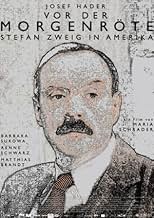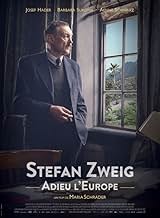Vor der Morgenröte
- 2016
- 1h 46min
CALIFICACIÓN DE IMDb
6.7/10
2.8 k
TU CALIFICACIÓN
Narra los años de exilio del famoso escritor judío austriaco Stefan Zweig, su lucha interior por la "actitud correcta" ante los acontecimientos de la guerra que desgarró Europa, y su búsqued... Leer todoNarra los años de exilio del famoso escritor judío austriaco Stefan Zweig, su lucha interior por la "actitud correcta" ante los acontecimientos de la guerra que desgarró Europa, y su búsqueda de un nuevo hogar.Narra los años de exilio del famoso escritor judío austriaco Stefan Zweig, su lucha interior por la "actitud correcta" ante los acontecimientos de la guerra que desgarró Europa, y su búsqueda de un nuevo hogar.
- Dirección
- Guionistas
- Elenco
- Premios
- 6 premios ganados y 10 nominaciones en total
- Dirección
- Guionistas
- Todo el elenco y el equipo
- Producción, taquilla y más en IMDbPro
Opiniones destacadas
Josef Hader is one of the best actors you will ever see. Believe it. If you do not know anything about Zweig and if you want to see Hader acting, because you have not seen him before than go for this one. It is entertaining enough to sit it through somehow. And Hader is - as always - a magnet to the eyes. But apart from Haders's acting this movie is a disaster. Zweig's life has so much potential, but Maria Schrader decided to show Zweig's inner struggle with his emigration from Europe to America in 5 or 6 long snapshot-dialogues. And to deliver the message with everything what happened in Zweig's life, Schrader was forced to bend the talking in the dialogues in such a way that all information was said in some sort of everyday tittle-tattle between Zweig, his wives, and other people. So the movie gets very artificial and artistically forced. And so we got tired in our seats. It would have been much better to make a mock-documentary about Zweig (with Hader). Anyway, for lovers of great acting I recommend it, but only because of Hader's unmissable acting: to be honest, Hader could play an old sneaker resting for years in a shoe box and it would still be worthwhile seeing it.
The film, treated in a semi-documentary style with an accentuated preference for plan-sequences (in-camera editing of sequence-like shots), is interesting in itself. But even more interesting perhaps would be to seek, or rather to fantasize, what would have been Zweig's life had he not opted for a terminal attitude. He'd already seen the US joining the War. He probably felt that Germany would inevitably win the conflict, and this would bring about the extermination of Judaism, the end of Western-style democracies, and so on and so forth. Had he lived, however, he'd see the Allies gain the conflict, which would provide him with a breath of optimism and comfort. He'd see his adoptive country, Brazil, leaving (in 1945) a long-overdue dictatorship. Later, already an octogenarian, he'd see Brazil plunging onto another dictatorship - against which Zweig would certainly say nothing, not in the least because he was an anti-communist. One thing is certain: the writer would never live to witness the growth of the largest criminal organization ever invented in Brazil or, for that matter, in any other place. The "Land of the Future" (Zweig's book title) has been since very busy , trying hard to dump her historical promises into the trash cans of History...
10clanciai
This is a very sad film, but if the ambition was to give as correct and truthful a picture as possible of Stefan Zweig's exile dilemma, it has succeeded overwhelmingly well. The character of the film is as close to documentary as a feature film can be, it is almost overly realistic in catching every day life scenes of the author and his friends and family, and the introductory scenes in South America, especially the Pen conference in Buenos Aires in 1936 give insight enough into Stefan Zweig's public standing and views and his definite refusal to take any political standing at all. That was maybe his life's tragedy, he wanted to keep it pure of any commitment for or against any worldly state and ideology, but in the end he was forced to abandon his idealism to finally take a stand against nazism in his autobiography "The World of Yesterday" and his last work "Schachnovelle". That could be seen as a personal moral bankruptcy in giving up his idealistic view of humanity, and he committed his suicide almost directly after finishing the story. It was found after his death.
Of course, a film like this can't tell the whole truth but only give glimpses of it, but the glimpses are accurate and expressive enough and give a fairly good view of the whole picture. He actually contemplated suicide already much earlier in his career, he even asked his first wife Friederike to join him in suicide, but she had her two daughters (from a previous marriage) to live for, while his second wife was free to join him.
It's a beautiful picture for its infinite melancholy expressed only in suggestions but giving a very accurate interpretation of the very complex and tragic case of Stefan Zweig, who was the greatest writer of his time.
Of course, a film like this can't tell the whole truth but only give glimpses of it, but the glimpses are accurate and expressive enough and give a fairly good view of the whole picture. He actually contemplated suicide already much earlier in his career, he even asked his first wife Friederike to join him in suicide, but she had her two daughters (from a previous marriage) to live for, while his second wife was free to join him.
It's a beautiful picture for its infinite melancholy expressed only in suggestions but giving a very accurate interpretation of the very complex and tragic case of Stefan Zweig, who was the greatest writer of his time.
A great film . For message, for fine exporation of immigration in war time, for acting and for the impressive solution - the mirror on the door of wardrobe as good example.
Indeed, it seems a sketch.
Good cinematography, impressive acting but not very profound, to thesistic accents.
But, for me, this is its basic virtue. The humanism of Stefan Zweig , expored, in gentle manner from inside, the essence of the great ideas reflected by his books, ambiguities poetic used, the pressure of friends and ex enemies to be helped, saved, his power accentuating his vulnerabiity.
It is more than a biographic film. For the magnificent work of Josef Hader, for the inspired perspective of Maria Schrader , it represents a wise remind of fundamental values defining our society.
Indeed, it seems a sketch.
Good cinematography, impressive acting but not very profound, to thesistic accents.
But, for me, this is its basic virtue. The humanism of Stefan Zweig , expored, in gentle manner from inside, the essence of the great ideas reflected by his books, ambiguities poetic used, the pressure of friends and ex enemies to be helped, saved, his power accentuating his vulnerabiity.
It is more than a biographic film. For the magnificent work of Josef Hader, for the inspired perspective of Maria Schrader , it represents a wise remind of fundamental values defining our society.
--> lack of plot or interest. Great acting, dialogue, casting, etc, etc. But just too talky, boring and ultimately I no longer cared what was going to happen (although I pretty well knew in advance how things turned out, anyway).
¿Sabías que…?
- TriviaOfficial submission of Austria for the 'Best Foreign Language Film' category of the 89th Academy Awards in 2017.
- ConexionesFeatured in Women Make Film: A New Road Movie Through Cinema (2018)
- Bandas sonorasThe Blue Danube Waltz
Composed by Johann Strauss
Selecciones populares
Inicia sesión para calificar y agrega a la lista de videos para obtener recomendaciones personalizadas
- How long is Stefan Zweig: Farewell to Europe?Con tecnología de Alexa
Detalles
- Fecha de lanzamiento
- Países de origen
- Sitio oficial
- Idiomas
- También se conoce como
- Stefan Zweig: Farewell to Europe
- Locaciones de filmación
- São Tomé e Príncipe(Bahia, Brazil)
- Productoras
- Ver más créditos de la compañía en IMDbPro
Taquilla
- Total en EE. UU. y Canadá
- USD 78,372
- Fin de semana de estreno en EE. UU. y Canadá
- USD 11,729
- 14 may 2017
- Total a nivel mundial
- USD 1,370,772
- Tiempo de ejecución1 hora 46 minutos
- Color
- Relación de aspecto
- 2:39
Contribuir a esta página
Sugiere una edición o agrega el contenido que falta

Principales brechas de datos
By what name was Vor der Morgenröte (2016) officially released in Canada in English?
Responda





































